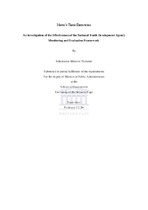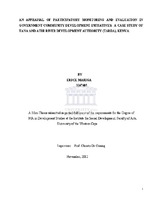| dc.contributor.advisor | Coning, Christo de | |
| dc.contributor.author | Fonkem, Nguika Judith | |
| dc.date.accessioned | 2015-03-03T09:00:58Z | |
| dc.date.available | 2015-03-03T09:00:58Z | |
| dc.date.issued | 2012 | |
| dc.identifier.uri | http://hdl.handle.net/11394/4007 | |
| dc.description | Magister Public Health - MPH | en_US |
| dc.description.abstract | Over the years major changes have occurred in the focus, approach and application of monitoring and evaluation systems as a result of increased levels of emphasis towards achieving results (outcomes) as opposed to activities and outputs. As the focus of management changes from activities to results, so too has the focal point of M&E shifted from the traditional M&E system of progress monitoring that only deals with assessing inputs and implementation processes, to a results-based M&E system that emphasizes the need to assess the contributions
of intervention to development outcomes. Nowadays funders, stakeholders and donor agencies want to see the difference that development initiatives make in the livelihood of project beneficiaries.Results-based M&E systems are essential components of most organisational structures responsible for development services and this is very fundamental as it provides vital information and empowers policy makers to take better informed decisions. The foundation of an M&E system is the very first step which is in essence called a ‘readiness assessment’. Such an assessment must be conducted before the actual establishment of an M&E system. Just as a building must begin with a foundation, constructing an M&E system must also begin with the establishment of a readiness assessment. Without this assessment and an understanding of the preparedness and commitment of the organisation, establishing an M&E system may be fraught with difficulties and failure.The Monitoring and Evaluation (M&E) of the Early Childhood Development (ECD) Programme of Ikamva Labantu has always been in the form of a reporting-type check list. The Centre is in a process of establishing an effective M&E system. The problem being investigated in this study is whether Ikamva Labantu has achieved a sufficient level of readiness to establish a results-based
monitoring and evaluation system. However, the study shall also highlight crucial aspect of PM&E and RBM&E that will have to be taken into consideration with the establishment of the actual M&E system.With the use of the qualitative research method, the aim of this study is to analyse and assess the readiness assessment phase for establishing a monitoring and evaluation system in the Early Childhood Development (ECD) Programmes of Ikamva Labantu Centre, Khayelitsha. | en_US |
| dc.language.iso | en | en_US |
| dc.publisher | University of the Western Cape | en_US |
| dc.subject | Accountability and transparency | en_US |
| dc.subject | Capacity building | en_US |
| dc.subject | Development | en_US |
| dc.subject | Early childhood development | en_US |
| dc.subject | Empowerment | en_US |
| dc.subject | Evaluation | en_US |
| dc.subject | Ikamva Labantu | en_US |
| dc.subject | Monitoring | en_US |
| dc.subject | Monitoring and Evaluation (M&E) | en_US |
| dc.subject | Participation | en_US |
| dc.subject | Participatory Monitoring and Evaluation (PM&E) | en_US |
| dc.subject | Readiness assessment | en_US |
| dc.subject | Results-Based Monitoring and Evaluation (RBM&E) | en_US |
| dc.title | An Analysis of a Readiness Assessment for establishing a Monitoring and Evaluation System in Early Childhood Development (ECD) Programmes: a case study of Ikamva Labantu Centre, Khayelitsha | en_US |
| dc.type | Thesis | en_US |
| dc.rights.holder | University of the Western Cape | en_US |




